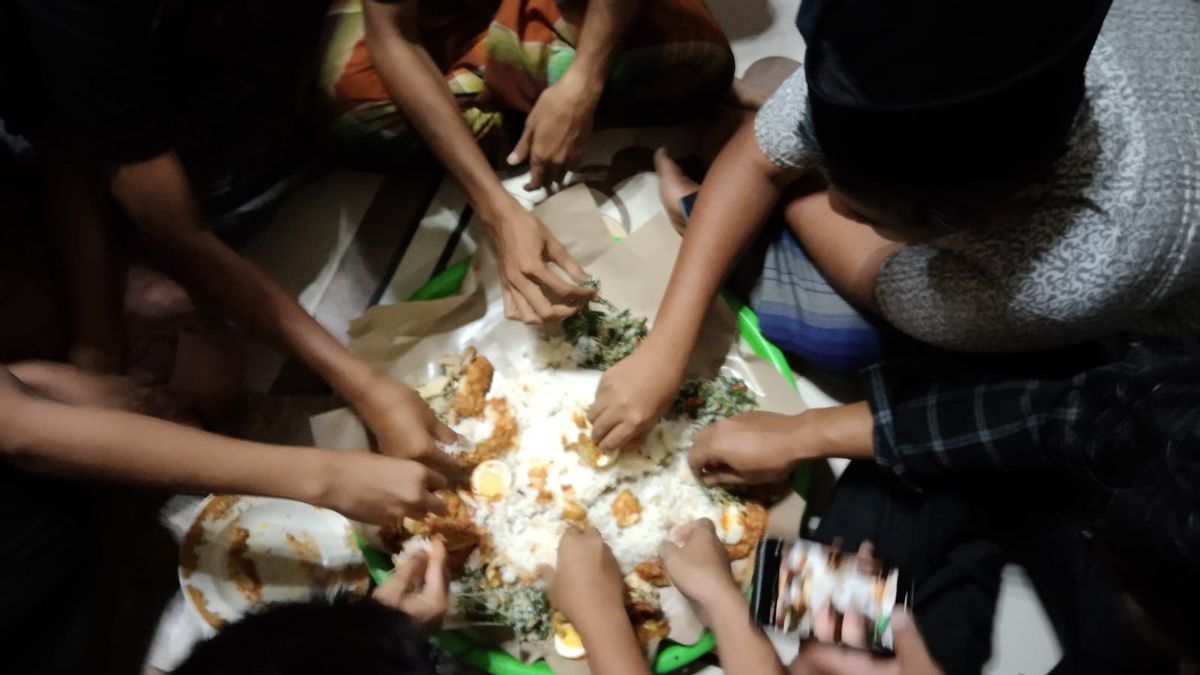DENPASAR - Residents who took turns brought food to the Al-Muhajirin Mosque in Kepaon Islamic Village, in South Denpasar District, Denpasar City, Bali.
Residents deliver food, both takjil and kapar rice, such as tumpeng rice which is placed on a large bowl to hold a habit of megibung or the tradition of eating together in the same container in the Al-Muhajirin Mosque when the Maghrib prayer is over.
"Megibung di Kampung Islam Kepaon ini merupakan tradisi kami di sini," kata Padani, salah satu tokoh masyarakat di Kampung Islam Kepaon saat ditemui di Masjid Al-Muhajirin, Kamis, 21 Maret.
Ahead of breaking the fast, residents, both parents and young people and congregation, began to visit the Al-Muhajirin Mosque and mosque administrators were seen busy receiving food from the residents of the Islamic Village of Kepaon who continued to arrive.
Foods brought in various kinds, ranging from Kapar rice typical of Kampung Islam Kepaon whose menus are vegetable urap, eggs, grilled chicken and sambal and there are other menus placed on large dishes and there are also residents who bring lots of rice packs and boxed rice, takjil and fresh drinks.
Furthermore, the mosque administrators collected food and takjil and then placed the dish neatly inside the mosque, so that residents who want to follow the megibung tradition just have to sit down and wait for the call to break their fast. However, while waiting for the call to prayer to break the fast, a number of residents recite the Koran.
When the call to prayer reverberated, the residents did not immediately hold a megibungan tradition and only tasted the takjil that had been served and then the Maghrib prayer in congregation and after the prayer, a megibungan tradition was held.
When joining residents to eat together in the same container. There are also different side dishes and in one container, there are four or five people eating together. There is no awkward feeling between them when playing. Children to parents can eat in one container. They just adjust the desired food.
"This tradition has existed since the Kepaon people were here and this tradition can be maintained until now," he added.
This unique tradition of megibung is a form of expression of gratitude after the khataman or completing reading the Koran. Because, during Ramadan, local residents at the Al-Muhajirin Mosque carry out the tadarus of the Qur'an by reading three juz which are held at night after tarawih prayers and within 10 days can recite the Qur'an and on the 20th and 30th days, the people of Kepaon carry out megibungan to break the fast together after re-creating the Qur'an.
"Why on the 10th, 20th or 30th days (Megibung). Because of this, every day they finish tarawih prayers every day young people here hold tadarus. The Qur'an consists of 30 juz and every night the children here read the Qur'an up to three juz and finally every 10 days we hold a khataman," he said.
"That understanding, because of our gratitude for completing the reading of the Qur'an up to 30 juz, we are holding this event," he explained.
In addition, residents provide food divided into three places. Residents of Kepoon Islamic Villages take turns from the south, center and north every 10 days. At 10 days of Ramadan, donations started from residents to the south.
"So the first 10 days of the dish in the form of kapar rice were issued by the people who were in the south of the mosque. Then in the second 10 days, the dish was released by the people who were in the middle of the mosque and the third 10 days were held again as a disclosure of gratitude. the dish was issued by the people who were in the north of the mosque," he said.
Padani stated that this megibung tradition is thought to have existed in the Islamic Village of Kepaon since the 17th century.
"Islam has entered Kepaon (expected) since the 17th century. So megibunggi is a Balinese tradition, we are Kepaon (also) Balinese people," he said.
The English, Chinese, Japanese, Arabic, and French versions are automatically generated by the AI. So there may still be inaccuracies in translating, please always see Indonesian as our main language. (system supported by DigitalSiber.id)








